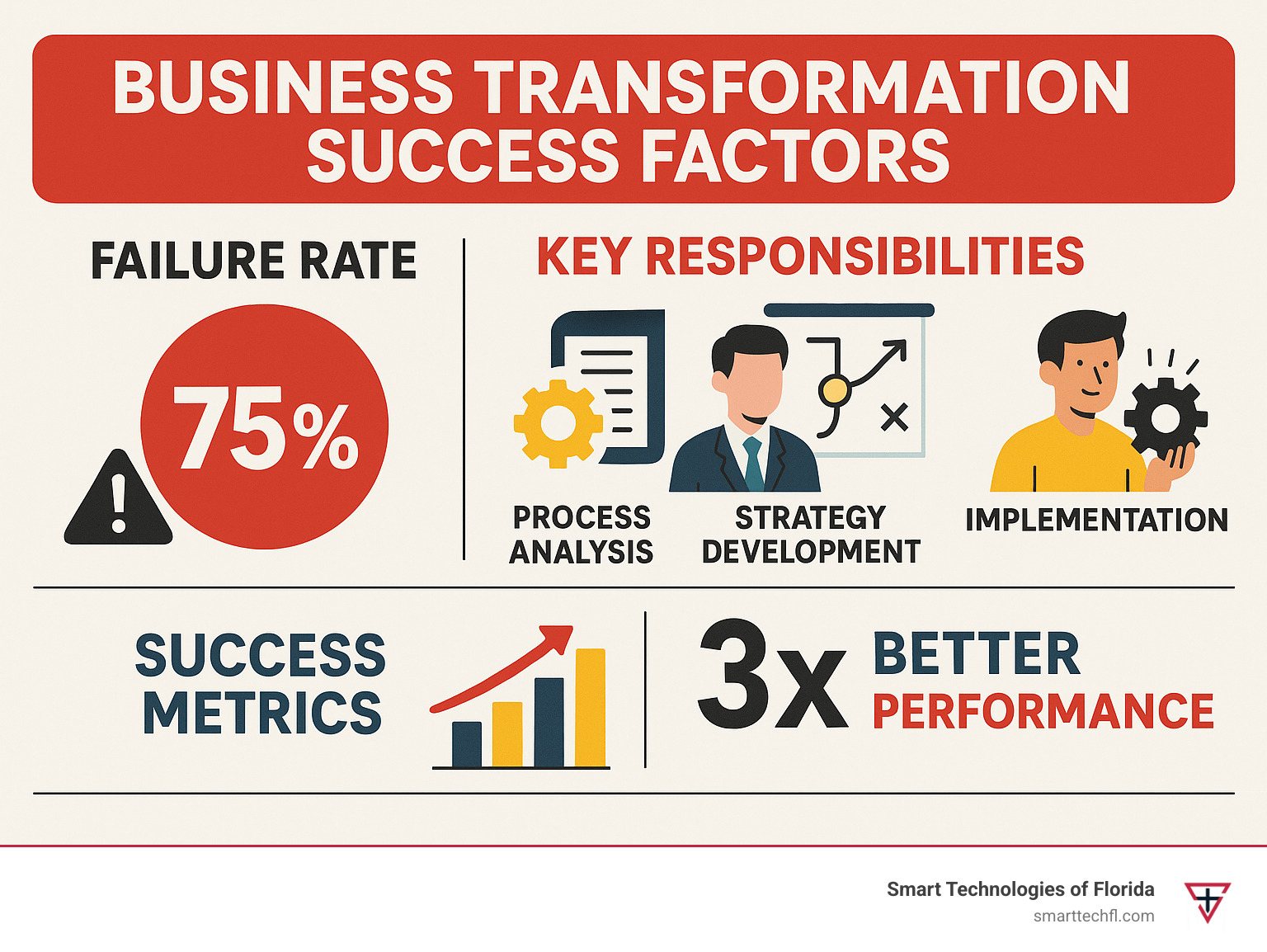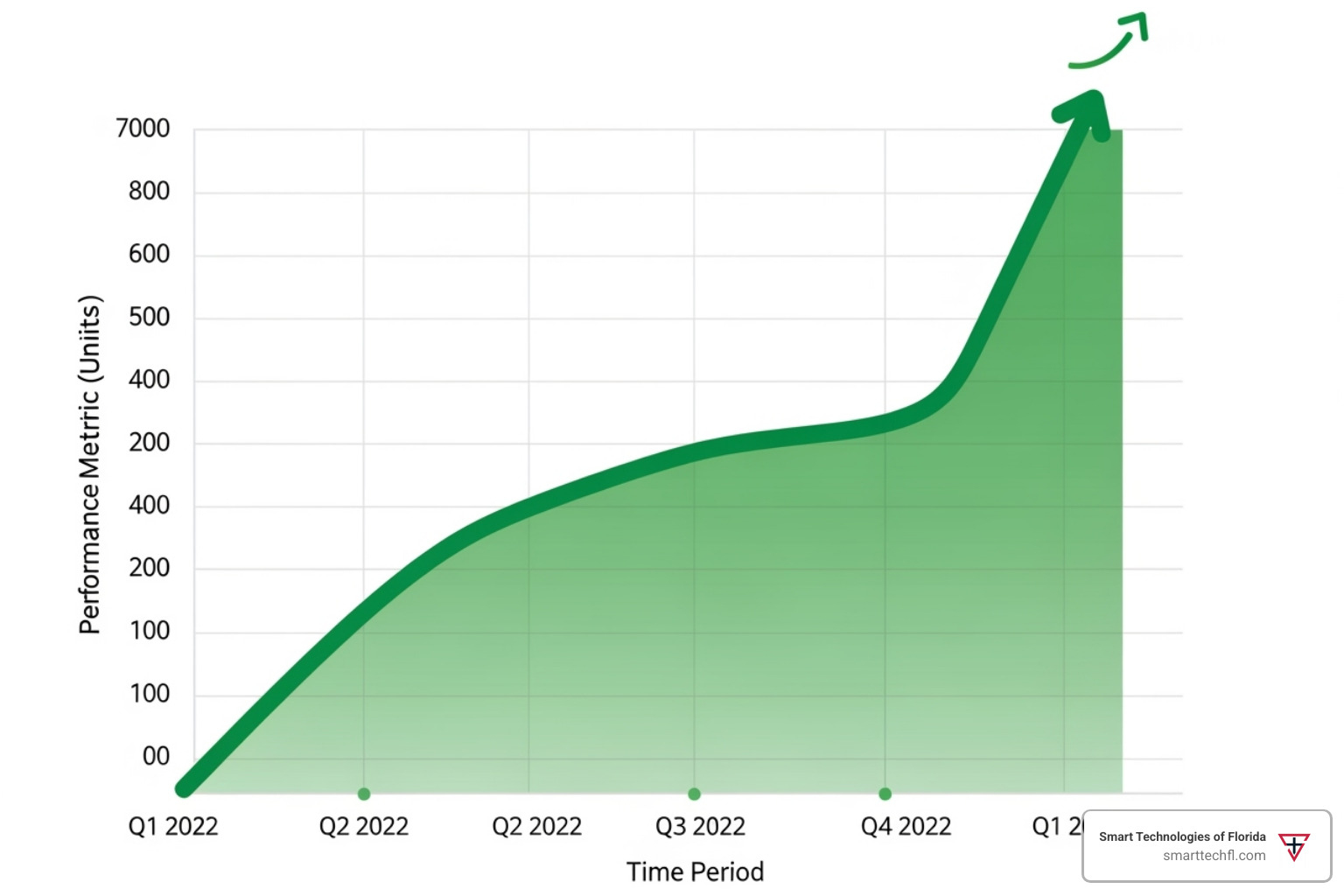Inside the Mind of a Transformation Consultant (No Capes Required)
AI Overview:
A business transformation consultant helps organizations navigate major change with clarity and control. Acting as a strategic partner, they align people, processes, and technology to drive measurable results.
From digital upgrades to cultural shifts, these experts turn disruption into progress—reducing costs, boosting efficiency, and strengthening competitiveness. Their structured, people-centered approach ensures every change delivers long-term value.
Picture this: you’re navigating stormy business waters with an outdated map. That’s what running a business feels like today without the right guidance. The harsh reality? 75% of business change initiatives fail, leaving companies stuck while competitors sail ahead.
A business change consultant is your lighthouse in the fog—a strategic partner who rolls up their sleeves to solve problems, not just point them out.
But what goes on inside the mind of these change champions? How do they turn chaos into clarity and resistance into results? This guide pulls back the curtain on business change consulting. You’ll find proven strategies, learn from real success stories, and understand why the right consultant is essential for building a future-ready organization.
Why Business Change Consultants Are Essential
A startling 75% of business changes fail to deliver expected long-term results. Conversely, organizations that succeed are three times more likely to outperform competitors. The difference often lies in having the right guide.
A business change consultant is a strategic partner who helps organizations steer complex changes. They bring invaluable specialized expertise and an objective perspective, seeing the bigger picture when internal teams are too close to the issues. A business change consultant doesn’t just deliver a report; they roll up their sleeves to implement new systems, train teams, and measure results.

Change often fails because it impacts every part of an organization: strategy, processes, technology, and especially people and culture. Coordinating these moving parts is a massive challenge. Whether you’re facing competitive pressure or outdated systems, a consultant can mean the difference between success and becoming another cautionary tale. The market waits for no one; adaptation is key to survival and growth.
What is a Business Change Consultant & What Do They Do?
Disruption is inevitable. With 87% of senior business leaders calling digitalization a top priority, the ability to adapt quickly is paramount. This is where a business change consultant becomes your secret weapon for getting ahead of change, not just reacting to it.
A business change consultant specializes in guiding organizations through significant, enterprise-wide changes. They provide deep expertise, a fresh objective perspective, and proven methodologies to turn chaos into progress. Their core role is to offer strategic guidance and help your team steer the journey successfully.
This specialized knowledge is essential for thriving in a digital world. To learn more about how digital solutions can transform your business, explore our Digital Change Consulting Services. Understanding these shifts is crucial, which is why we emphasize why companies must adapt to stay ahead.
The Different Flavors of Change
Change isn’t one-size-fits-all. It’s the pursuit of new value, whether through new markets, cost savings, or technology.
- Digital change: Weaving technology into all business areas to change how you operate and deliver value.
- Operational improvement: Streamlining workflows to boost efficiency and cut waste. This can reduce operational costs by 20-30%.
- Strategic overhaul: Redefining a company’s core direction, market position, and competitive advantage.
- Financial restructuring: Reorganizing a company’s financial structure to improve cash flow, reduce debt, or boost profitability.
- Mergers & Acquisitions (M&A) integration: Merging cultures, systems, and processes to create a stronger, unified entity.
- Cultural change: Shifting an organization’s values and behaviors to align with new strategies. As management guru Peter Senge noted, organizations often have “self-healing powers” that resist change, making expert guidance crucial.
Common Business Challenges They Solve
A business change consultant is typically called in to address these common pain points:
- Stagnant growth: When revenue flatlines and old strategies no longer work.
- Declining profitability: High costs and inefficient operations eating into the bottom line.
- Inefficient processes: Outdated workflows that frustrate employees and customers.
- Outdated technology: Legacy systems that hinder innovation and competitiveness.
- Poor customer experience: Leading to customer churn and a damaged brand reputation.
- Low employee morale: Resulting in disengagement, high turnover, and resistance to change.
- Post-merger integration challenges: Misaligned cultures and systems that erode the value of a merger.
The Consultant’s Playbook: Responsibilities, Skills, and Process
At Smart Technologies of Florida, we believe effective change requires a clear process and a people-centric methodology. Our approach guides you every step of the way, ensuring change is implemented and acceptd. For a deeper dive, check out our Organizational Change Management Guide.

Core Duties of a Business Change Consultant
A consultant acts as a detective, strategist, and coach. Key duties include:
- Business process analysis: Mapping current operations to identify bottlenecks and compare the “As-Is” state to the “To-Be” vision.
- Opportunity identification: Using data and stakeholder interviews to find opportunities for innovation, cost savings, and growth.
- Strategic planning: Crafting actionable change plans with clear goals and realistic timelines that align with business objectives.
- Change management facilitation: Guiding teams through transitions, managing resistance, and fostering support for new ways of working.
- New system implementation: Overseeing the integration of new technologies to ensure they meet business needs.
- Staff training and education: Equipping employees with the skills and confidence to succeed in the new environment.
- Performance metric tracking: Defining and monitoring KPIs to ensure the change delivers measurable value.
Essential Skills for a Business Change Consultant
A great consultant blends analytical and interpersonal skills:
- Analytical and Strategic Thinking: Excelling at data analysis and problem-solving to identify root causes and formulate innovative solutions.
- Communication and Interpersonal Skills: Clearly conveying complex ideas, facilitating workshops, and securing buy-in from the C-suite to the front lines.
- Project and Change Management: Using methodologies like Agile to manage projects, mitigate risks, and keep initiatives on track.
- Technical and Business Acumen: Understanding industry dynamics, financial principles, and how technology creates business advantage.
- Leadership and Influence: Guiding and inspiring teams, coaching individuals, and influencing decision-makers to accept change.
The Typical Change Journey: A 5-Step Process
We follow a structured, phased approach to turn chaos into clarity:
- Prepare & Evaluate: We conduct a thorough assessment of your current state to identify core obstacles and gather performance data.
- Strategize & Roadmap: We define the desired future state (e.g., a Target Operating Model), set clear goals, and create an actionable roadmap with manageable phases.
- Implement & Execute: We deploy new processes, technologies, and organizational structures with precision and clear communication.
- Manage & Adopt: We focus on the human side of change, managing resistance, fostering a positive culture, and ensuring widespread employee buy-in.
- Measure & Optimize: We continuously track KPIs and ROI to measure value and make iterative improvements, ensuring the change is sustainable.
The Value Proposition: Why Hire a Business Change Consultant?
Hiring a business change consultant isn’t an expense; it’s a strategic investment in your future. Companies that manage change effectively are three times more likely to outperform competitors in total shareholder return. This is the difference between thriving and merely surviving.

Consultants provide the specialized knowledge and objective perspective that internal teams often lack, uncovering significant opportunities. Our Business Process Automation Services exemplify how this expertise translates into tangible value and long-term competitive advantages.
Open uping Tangible Benefits
Working with a consultant delivers measurable improvements:
- Efficiency Gains: Systematically redesigning processes can reduce operational costs by 20-30% and improve cycle times by 40-60%.
- Cost Reduction: Identifying and eliminating resource waste and system redundancies.
- Increased Revenue: Optimizing strategies and leveraging data can generate up to 8% more revenue than competitors.
- Improved Customer Satisfaction: Smoother processes and better technology lead to more responsive service and happier customers.
- Higher Employee Engagement: Successful change projects see 63% employee support, more than double that of failed projects, leading to a more motivated workforce.
A skilled consultant helps you get ahead of the curve. While 87% of leaders prioritize digitalization, execution is key. We provide expertise in emerging technologies like AI and automation to determine what makes strategic sense for you.
- Adopting AI and Automation: Thoughtful implementation can free up 30% of employee time for higher-value work. Our AI Automation Tools guide offers deeper insights.
- Building an Agile Organization: Agile companies adapt and make decisions five to ten times faster than competitors, a crucial advantage in today’s market.
- Fostering a Culture of Continuous Improvement: We help instill a mindset of constant innovation, ensuring your organization is always looking for ways to improve long after our engagement ends.
Measuring Success and Delivering Value
We believe in data-driven results. Success isn’t a guess; it’s measured.
- Key Performance Indicators (KPIs): We define and track specific, measurable targets tied to your strategic goals, from financial results to operational efficiency and customer satisfaction.
- Return on Investment (ROI): We ensure every dollar invested in change generates a clear, measurable return.
- Balanced Scorecard Approach: We look beyond financials to assess customer response, internal process improvements, and team growth for a holistic view of success.
- Long-Term Sustainability: The ultimate test is whether changes stick and deliver value long-term. We work closely with leadership to ensure this, as strong leadership involvement increases the likelihood of success by 6.3 times.
The Blueprint for Success: Key Factors and Real-World Impact
For change to deliver lasting value, key factors like leadership commitment, a clear vision, and robust employee support are essential. People are paramount; employee support is present in 63% of successful cases versus only 30% of failed ones. When leaders champion change and employees feel valued, change happens. We focus on streamlining business processes to build efficiency into your organization’s core.

Fostering a Culture of Change
A consultant helps create an environment where change is natural and welcomed.
- Top-down and bottom-up communication: Combining strategic direction from leadership with grassroots engagement from the front lines.
- Empowering employees: Turning passive recipients into active champions by giving them ownership in the process.
- Celebrating small wins: Building momentum and encouraging calculated risk-taking by acknowledging progress milestones.
- Creating psychological safety: Fostering an environment where employees feel safe to voice opinions, experiment, and innovate without fear of punishment.
The Role of Technology and Data
Technology and data are the engines of modern business change.
- Data-driven decision making: Using analytics to move beyond guesswork. Top performers use analytics five times more than their peers.
- Workflow automation: Automating repetitive tasks to free up 30% of employee time for more strategic work.
- Business technology upgrades: Guiding organizations through planned upgrades to ensure new systems improve, not disrupt, operations. Learn more about strategic business technology upgrades.
- Predictive analytics: Using historical data to reduce forecasting errors and cut inventory costs.
- AI-powered insights: Analyzing vast datasets to identify patterns and generate actionable insights.
- Centralized data platforms: Creating a single source of truth to break down information silos.
Change in Action: Anonymous Case Studies
These real examples demonstrate the tangible impact a skilled business change consultant can deliver:
- Logistics Firm: We helped implement advanced routing software and streamlined logistics operations. The results were a 33% reduction in delivery times and a 27% reduction in costs.
- Financial Institution: We guided them through compliance reviews and new digital product development, leading to 36% growth in their client base.
- Manufacturing Company: We introduced intelligent automation and redesigned production processes, resulting in a 20% increase in production efficiency and improved product quality.
Frequently Asked Questions about Business Change Consultants
Here are answers to the most common questions about working with a business change consultant:
What's the difference between a management consultant and a business change consultant?
While there's overlap, the focus differs. Management consultants often diagnose specific functional problems and provide recommendations. A business change consultant takes a holistic, end-to-end approach. We are implementation partners, not just advisors. We work across your entire organization—people, processes, and technology—and stay with you through execution to ensure changes stick.
How do consultants measure the success of a change?
We measure success using a combination of quantitative and qualitative data. Quantitative metrics include Key Performance Indicators (KPIs) like revenue growth, cost savings, ROI, and operational improvements (e.g., reduced cycle times). Qualitative measures include employee engagement surveys, customer satisfaction scores (like NPS), and assessments of cultural adoption. We align on these goals upfront and track progress continuously to provide a complete picture of success.
How long does a typical business change project last?
Timelines vary based on scope and complexity. A targeted process improvement might take 3-6 months. A comprehensive digital or strategic change for a large enterprise could last 18-36 months. However, we break large projects into smaller, manageable phases, each delivering tangible value and building momentum along the way. Our initial assessment provides a realistic roadmap with clear milestones.
A business change consultant is more than an advisor; they are a catalyst for change and a strategic partner guiding you through complexity.
At Smart Technologies of Florida, our people-centric approach and 23 years of experience ensure that every solution is custom to your unique goals. We don’t just implement new systems; we empower your people and foster a culture of innovation to achieve sustainable growth.
Our mission is to turn your challenges into opportunities and chaos into clear strategies. With the right partner, change is an exciting opportunity, not an overwhelming obstacle. We build future-ready organizations that lead their industries.
Ready to open up your business’s full potential? Learn how we can partner with you at Smart Technologies of Florida.
Key Takeaway:
A business change consultant is your strategic partner for navigating complex change, open uping value, and building a future-ready organization.












